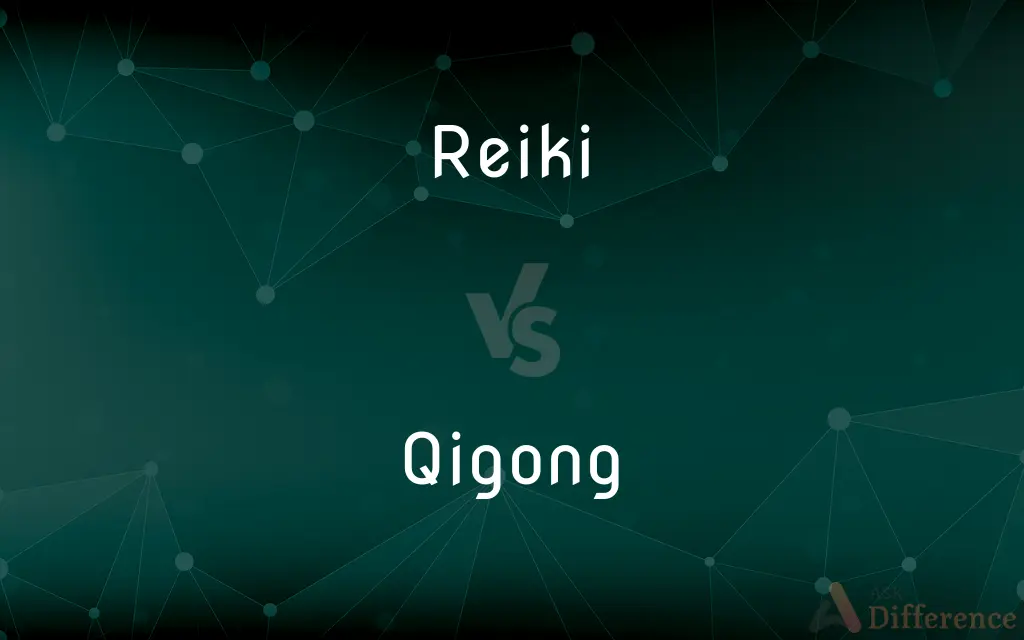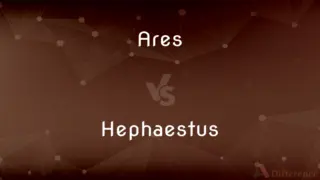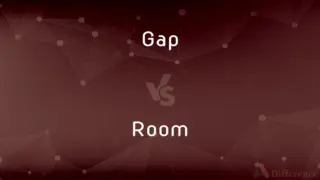Reiki vs. Qigong — What's the Difference?
By Maham Liaqat & Urooj Arif — Updated on April 16, 2024
Reiki involves channeling universal energy for healing, primarily through touch, focusing on spiritual balance; Qigong combines movement, meditation, and controlled breathing to enhance physical and mental health.

Difference Between Reiki and Qigong
Table of Contents
ADVERTISEMENT
Key Differences
Reiki, a Japanese technique, emphasizes healing by laying hands to channel universal life energy into the body, aiming to enhance spiritual and emotional well-being. On the other hand, Qigong, rooted in Chinese tradition, involves specific physical postures and exercises to cultivate body energy, or Qi, focusing more on physical health and vitality.
Reiki practitioners often use their technique as a complementary therapy, providing gentle touch that can help alleviate stress and promote deep relaxation. Whereas Qigong is practiced both as a form of physical exercise and a meditative technique, helping improve fitness and reducing stress through dynamic movements and still meditations.
In Reiki, the flow of energy is directed by the healer, who places hands over specific body parts, channeling healing from a higher source. In contrast, Qigong practitioners direct their own body's energy through concentration, breath work, and fluid movements, aiming to improve their own energy systems.
Reiki sessions typically occur in a quiet, private setting to enhance the recipient’s meditative state and facilitate emotional healing. Conversely, Qigong can be practiced alone or in groups, often outdoors, making it a more versatile and socially engaging activity.
While Reiki is mainly passive, involving receiving energy from a practitioner, Qigong is an active practice requiring personal effort and discipline to master the techniques that maintain and enhance one’s health.
ADVERTISEMENT
Comparison Chart
Origin
Japanese
Chinese
Focus
Spiritual and emotional healing
Physical health and mental vitality
Method
Hands-on energy channeling
Movements, meditation, and breathing
Setting
Typically private and quiet
Can be practiced in various settings, including outdoors
Participation
Passive (received from a practitioner)
Active (self-directed and involves physical exercise)
Compare with Definitions
Reiki
A healing technique based on the principle of free and uninterrupted energy flow.
She found Reiki beneficial in managing her anxiety.
Qigong
A traditional Chinese mind-body-spirit practice that integrates posture, movement, breathing technique, and focused intention.
Qigong is often recommended to improve balance and flexibility.
Reiki
A method to improve health and quality of life through energy healing.
Reiki sessions often leave participants feeling refreshed and balanced.
Qigong
An ancient Chinese exercise and healing technique involving meditation, controlled breathing, and movement exercises.
She practices Qigong in the park every morning to revitalize her energy.
Reiki
A practice involving the transfer of universal energy from the practitioner's palms to the patient.
During the Reiki session, he felt a warm sensation as the practitioner moved her hands above his body.
Qigong
A form of gentle exercise, often described as meditation in motion.
Qigong is considered a gentle way to manage stress and anxiety.
Reiki
A complementary therapy often used alongside conventional treatments.
He used Reiki to complement his cancer treatment, aiming to ease chemotherapy side effects.
Qigong
A technique used to cultivate and balance the body's energy, known as 'Qi.'
Qigong teaches how to control the flow of Qi to improve health.
Reiki
A spiritual healing practice with roots in Japanese wellness traditions.
Reiki's principles are deeply intertwined with spiritual growth and emotional healing.
Qigong
A discipline for achieving calm, natural balance, and health enhancement through one's intrinsic life force.
His daily Qigong routine helps him maintain high energy levels throughout the day.
Reiki
Reiki (霊気, ) is a Japanese form of energy healing, a type of alternative medicine. Reiki practitioners use a technique called palm healing or hands-on healing through which a "universal energy" is said to be transferred through the palms of the practitioner to the patient in order to encourage emotional or physical healing.
Qigong
A Chinese system of prescribed physical exercises or movements performed in a meditative state.
Reiki
A method of treating bodily disorders and restoring spiritual balance in which a practitioner places the palms of the hands on a part of the body in the belief that healing energy will flow there.
Qigong
A Chinese system of breathing control, physical exercise and meditation.
Reiki
A Japanese form of pseudomedicine that involves transferring chi through one's palms.
Common Curiosities
What is the primary goal of Reiki?
The primary goal of Reiki is to facilitate healing and promote a sense of peace and well-being through energy transfer.
Are there different styles or schools of Reiki and Qigong?
Yes, both practices have various styles and schools, each with unique techniques and teachings.
Can Reiki and Qigong be self-taught?
While basic techniques of Qigong can be self-taught, Reiki typically requires training under a certified practitioner to learn energy channeling.
What are the typical durations of Reiki and Qigong sessions?
A typical Reiki session lasts about 60 to 90 minutes, while Qigong can vary from a few minutes to an hour, depending on the practice.
Who can benefit from practicing Reiki and Qigong?
Individuals seeking emotional, spiritual, or physical healing can benefit from Reiki, whereas Qigong is suitable for those looking to improve physical health and reduce stress.
How do Reiki and Qigong differ in their approach to energy?
Reiki focuses on channeling external universal energy into the body for healing, while Qigong focuses on cultivating and balancing one's own internal energy.
How does Qigong promote health?
Qigong promotes health by enhancing physical vitality and mental clarity through integrated physical postures, breathing techniques, and focused intention.
How do practitioners of Reiki and Qigong receive their training?
Reiki practitioners often undergo a certification process, involving different levels of mastery, whereas Qigong can be learned from books, videos, or instructors.
What role does meditation play in Qigong and Reiki?
Meditation is central to Qigong, involving active engagement in meditative practices, whereas in Reiki, it aids in the healing process and enhances the flow of energy.
Do Reiki and Qigong require special equipment?
No, both practices do not require any special equipment. Comfortable clothing is recommended.
Can Reiki or Qigong cure diseases?
Neither Reiki nor Qigong should be considered as a cure for diseases, but both can be effective complementary therapies for various conditions.
Is it necessary to have a belief in the principles of Reiki or Qigong to benefit from them?
While having a belief can enhance the experience, individuals may benefit from the practices even without a strong belief in their underlying principles.
How are Reiki and Qigong viewed in the context of modern healthcare?
They are often viewed as complementary therapies that can support conventional medical treatments by alleviating symptoms and improving quality of life.
Can children practice Reiki and Qigong?
Yes, both Reiki and Qigong are suitable for children, and can be adapted to suit their needs and capabilities.
What is the significance of breathing in Qigong?
Breathing is fundamental in Qigong, as it helps regulate the body's energy flow and aids in concentration and stress reduction.
Share Your Discovery

Previous Comparison
Ares vs. Hephaestus
Next Comparison
Gap vs. RoomAuthor Spotlight
Written by
Maham LiaqatCo-written by
Urooj ArifUrooj is a skilled content writer at Ask Difference, known for her exceptional ability to simplify complex topics into engaging and informative content. With a passion for research and a flair for clear, concise writing, she consistently delivers articles that resonate with our diverse audience.














































